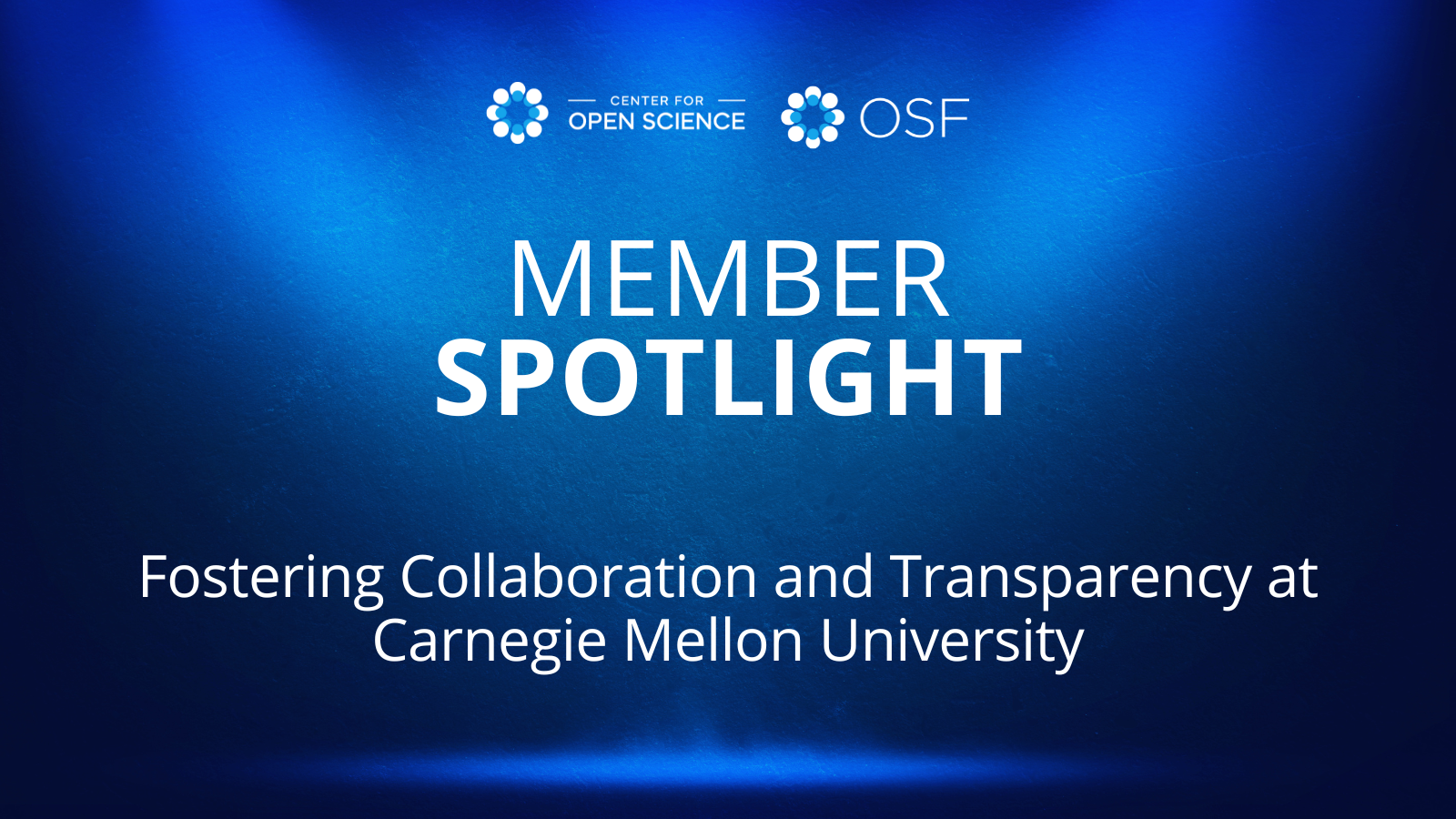
The following blog is based on a recent webinar with Carnegie Mellon University. You can watch the full recording here.
Member Spotlight: Fostering Collaboration and Transparency at Carnegie Mellon University
Carnegie Mellon University (CMU) is at the forefront of promoting open science through strategic initiatives, institutional support, and a collaborative culture. By addressing challenges and engaging stakeholders across the university, CMU is paving the way for a more transparent, inclusive, and impactful scientific enterprise. Support for open science at CMU extends beyond the library and research offices and includes active involvement from the highest levels of leadership.
Collaboration is Key
The CMU Open Science & Data Collaborations (OSDC) program, established in 2018, takes a comprehensive approach to open science, encompassing data management, open-source software promotion, and collaboration.
"We wanted to think about Open Science support for the entire research workflow," said Melanie Gainey, STEM Librarian and OSDC director. "Previously, support was focused on the end stages, like open access funding and institutional repository access. There's a growing recognition at CMU that open science necessitates better communication and workflow integration across departments. The OSDC is actively involved in facilitating these conversations and collaborations."
The university is looking at ways to integrate a more holistic vision of open science that goes beyond data sharing and recently created Open at CMU to improve the discovery and accessibility of services supporting open scholarship. CMU has a flourishing Open Educational Resources program and recently adopted open access publishing policies.
“We’re trying to think about how to move all of these things together, rather than separately. Thinking about reproducibility, accessibility, discoverability,” said Nicky Agate, associate dean for academic engagement. Forming connections and finding ways to collaborate is easier at CMU because of its small size and open culture. “The nature of CMU means that everyone has to be much more flexible and wants to be much more flexible,” said Agate.
Open Source Software
CMU's commitment to open science extends to a strategic investment in open-source software. While open access articles and open data have received significant attention from the research community, open-source software, which plays a critical role in digital infrastructure, hasn't garnered the same level of focus, according to Sayeed Choudhury, associate dean for digital infrastructure and director of the Open Source Programs Office. "Open source software plays a critical role in digital infrastructure,” he said. “We're dedicated to integrating it into our open science program."
The university’s Software Engineering Institute, largely funded by the Department of Defense, has developed one of the most organized repositories on GitHub, showcasing CMU’s dedication to open-source principles.
CMU is an OSF Institutions member and encourages and promotes the use of the Open Science Framework (OSF) across diverse fields. The OSF platform has experienced significant growth at CMU as researchers leverage it for preregistration, project hosting, and even hackathons. A recent AI Literacy Resource hackathon brought together researchers from various disciplines to create openly licensed resources.
Cloud Lab
As the first automated life sciences and chemistry lab in academia, the CMU Cloud Lab allows researchers to submit and conduct experiments via code from their computers. CMU Libraries prioritized open data practices to maximize the Cloud Lab’s impact, ensuring research transparency and collaboration.
CMU Libraries worked with researchers for three years to prepare for open data practices, including creating tools for easy data deposit in the institutional repository, along with training modules on data reproducibility. Librarians are also exploring ways to systematically integrate Cloud Lab data with various repositories to make research findings more discoverable and foster a more collaborative research environment.
Impact and Future Directions
With the adoption and encouragement of open science practices at CMU, researchers benefit from increased transparency and the ability to collaborate more effectively. CMU's emphasis on teamwork and collaboration encourages researchers to work together, share resources, and contribute to a collective body of knowledge. That environment ultimately leads to more robust and reliable science.
Looking ahead, CMU is currently launching a program, the Tartan Research Data Alliance, to train representatives from various labs and centers to promote open science practices within their communities. Additionally, there’s a desire to explore open access options for a diverse range of scholarly work, including video games and literary publishing.
Are you looking for ways to encourage open science and collaboration at your university? See how the OSF can help.

6218 Georgia Avenue NW, Suite #1, Unit 3189
Washington, DC 20011
Email: contact@cos.io

Unless otherwise noted, this site is licensed under a Creative Commons Attribution 4.0 International (CC BY 4.0) License.
Responsible stewards of your support
COS has earned top recognition from Charity Navigator and Candid (formerly GuideStar) for our financial transparency and accountability to our mission. COS and the OSF were also awarded SOC2 accreditation in 2023 after an independent assessment of our security and procedures by the American Institute of CPAs (AICPA).
We invite all of our sponsors, partners, and members of the community to learn more about how our organization operates, our impact, our financial performance, and our nonprofit status.